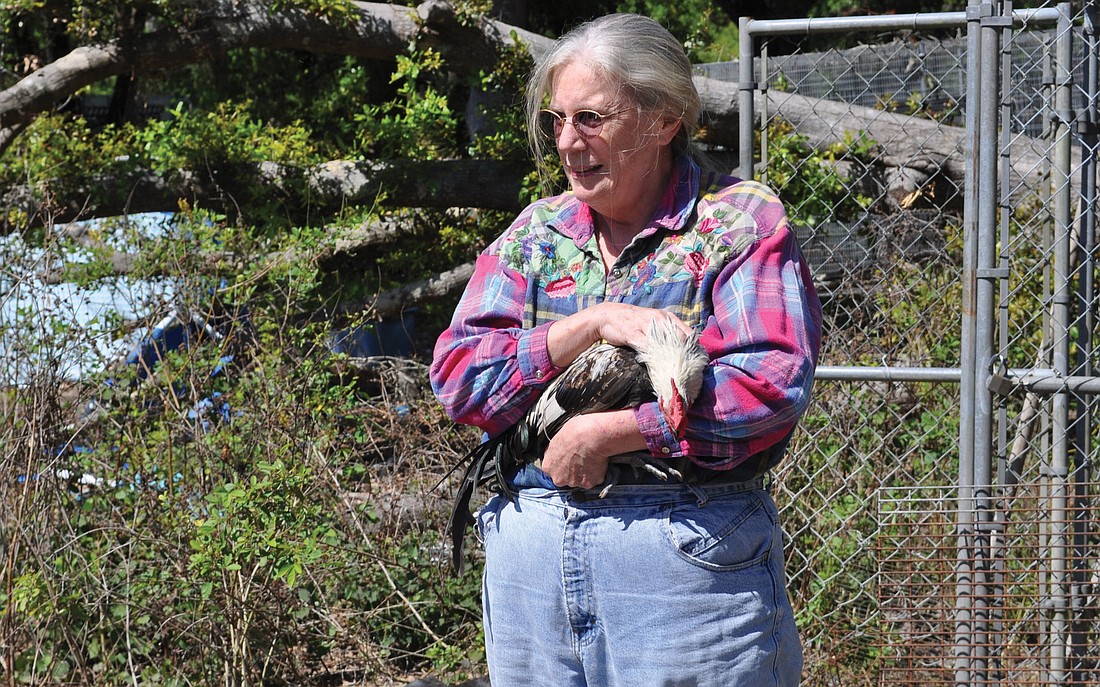- April 23, 2024
-
-
Loading

Loading

EAST COUNTY — It was the early ’70s and Peggy Hill, now a retired Palmetto High School teacher of environmental science and earth science, had rented a rundown farm house while she was on sabbatical from the University of Vermont, which she attended.
Hill inherited a hen on the farm and, after it laid eggs, she killed it for food.
The experience started Hill’s passion for chicken keeping that lives on today at her home off Upper Manatee River Road.
It’s a home that’s zoned for agriculture, off a dirt road where Hill’s two blue peacocks land at random on neighbors’ lawns, and no one seems to mind.
Hill keeps three hens, one rooster, 10 pullets (a young hen) and two turkeys on her property. Most are kept in coops, but some are free to roam, as they have been allowed to do for the last 20 years.
And, here, due to the property’s agricultural zoning, it’s perfectly legal for the hens to do so.
Hill supports the Manatee County Board of County Commissioner’s decision to direct staff to write an ordinance that would allow people to legally raise chickens in residential neighborhoods. The county’s attorney is working on a land-development code amendment that will remove “chickens/poultry” from the definition of farm animals. The item will brought to the county commission for a vote May 2. A followup vote on an ordinance to allow chickens would follow in late May or early June.
Under the county’s current land development code, it’s illegal to keep chickens in residential areas.
Robert A. Kluson, a co-leader of Manatee County’s chapter of the Citizens Lobbying for Urban Chicken Keeping (CLUCK), said he hoped a 2011 moratorium would be reinstated on citations for those keeping backyard chickens.
The Holmes Beach City Commission recently approved residential chickens in certain circumstances, while the cities of Sarasota and Palmetto both allow it, also under certain circumstances.
A witness to Sarasota’s process, Kluson was there when the county made residential chickens legal in 2011.
Kluson said, like in Pinellas County, visual barriers such as tree scrubs would have to separate coops from a neighbor’s property.
No roosters (or turkeys) are allowed, in any of those cases, and hens must be confined in a coop, as would be true in Manatee County.
Deed-restricted communities set their own rules and would not be part of any change to the law.
“Chickens provide safer food for families; they help people economically; and they can teach kids where food comes from,” Kluson said. “This is about self-reliance.”
Sarasota CLUCK works with county code enforcement to govern its rules, which limit property owners to having no more than four hens.
Rules don’t apply to Hill, because of her property’s zoning.
As soon as she retired from the Navy in January 2000, and after she and her ex-husband separated, she began dedicating much of her life to her land and the animals that enjoy it.
The environmental naturalist yanked invasive plants from the ground, planted a firebush to attract butterflies and hummingbirds and installed an incubator in her home to mimic the hatching process.
A group of seniors from Palmetto High School designed and built a giant, screened-in coop, attached with seven small “nest boxes.”
Addressing detractors, Hill says hens rarely make noise, help maintain a healthy lawn and eat bugs.
She sells a dozen eggs — eggs with dark-orange yolks — for $4 to her 90-year-old neighbor.
“I support what the county is doing,” Hill said. “But I would eat one of my hens if I had to.”
Contact Josh Siegel at [email protected].